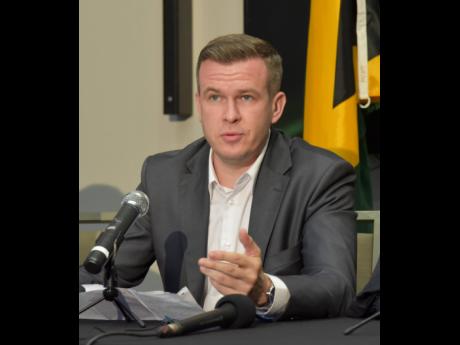WADA president: Doping fight more than ‘winning the battle’
IN THE fight against doping in sport, the issue is never about winning the battle. Witold Banka, the World Anti-Doping Agency (WADA) chief, is under no illusions regarding the enormity of their expensive undertaking to keep sport clean from drug-...
IN THE fight against doping in sport, the issue is never about winning the battle.
Witold Banka, the World Anti-Doping Agency (WADA) chief, is under no illusions regarding the enormity of their expensive undertaking to keep sport clean from drug-cheats he reckons are “developing every day”.
“Let me be frank with you, we’ll never totally eliminate doping from sport,” he said in an interview with The Gleaner. “We’re not able to eliminate crimes from everyday (life), so it’s obvious, always you’ll find someone who wants to cheat the system.
“In principle, it’s the same like with police, prosecutor, you’re never ahead of cheating. It’s not possible to predict that someone will cheat or do something wrong, but we have to have the tools that allow us to detect violations and to eradicate the cheats from the sport,” Banka reasoned.
As part of their continuous drive, WADA flew into the Caribbean for a two-day symposium last week and engaged nine sports ministers and other government ministers about ways to strengthen doping control.
Education, as always, is at the forefront of their drive in an operation funded by more than US$50 million yearly. And the world body continues to equip itself with more tools as they press for increased testing and collaboration, in the Caribbean, and on a wider scale.
“We put education in the centre of what we’re doing,” the WADA president said. “We don’t want to be perceived as only prosecutor, policemen, but we want to promote positive values from sport, that’s why education plays an important role in our future strategy.
“Our role is to do everything that we can to strengthen the system and we’re doing actually this,” explained Banka. “WADA is a completely different place and thing to the past.”
When he rose to the presidency in January 2019, the former Polish minister of sport said WADA’s budget was more or less (US) $37 million (approx. J$5.698 billion).
“Now we have more than US$50 million (approx. J$7.7 billion). In this three years we’ve increased significantly WADA’s budget, thanks to our hard work, but thanks to the fact that we convinced governments and the sports movement to pay more, to do more, so it was a great achievement,” he said.
“But we are still thinking what we can do more. That’s why we are looking for the partners from the private sector … sponsors to co-finance some education, some testing activities in the less developed regions. That is our goal.”
Asked about shortcomings that influenced WADA’s visit, Banka said: “First of all, let me be fair with you, there is a room for improvement in the Caribbean region. There are countries with a very weak anti-doping system, or even without testing activities in the region, that’s why I urge the ministers from the region to do more to start treating this issue seriously, and this is what we’ve done.”
Increased resources and staffing have also widened WADA’s range to challenge its enormous task.
“We’re very well equipped to be stronger. We’re able to conduct investigations. We collaborate with law enforcement, including Interpol,” the president articulated. “And we have a strong, robust monitoring compliance programme with the tools to even sanction countries if they’re not following our rules.”
Russia, in 2019, were sanctioned by WADA with a four-year ban from international sports for running a years-long state-sponsored doping scheme. The strength of the WADA’s penalty was influenced by efforts by the Russian Anti-Doping Agency (RUSADA) to cover up the doping programme.
The ban, which included exile from the Olympic and Paralympic Games and many other major events, was later cut in half by the Court of Arbitration for Sport (CAS).
Other countries have risked similar sanctioning as Russia, due to the level of doping associated with their athletes, including Kenya, which had 55 prominent athletes cited for banned substances at one point.
“So we are still constantly thinking how we can contribute so we can launch some new innovative programmes like DBS (dry blood spot),” Banka shared of WADA’s additional testing programme that was launched one year ago.
The DBS testing, according to Wikipedia, is a form of biosampling where blood samples are bottled and dried on filter paper. The dried samples can easily be shipped to an analytical laboratory and analysed using various methods such as amplification, or HPLC (high-performance liquid chromatography).
“So many, many other areas have been improved. I think it’s a big achievement, but we’ve to constantly think what we can do,” said Banka. “They’re thinking how to cheat the system as well; we’ve to be strong.
“So it’s not about whether we are winning the battle. For sure, we are stronger. We are stronger and we are confident that the anti-doping system works well. It’s not perfect, nobody’s perfect, but the anti-doping system is much stronger than it has been in the past.”

